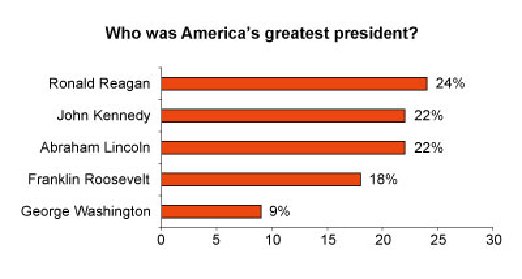Two of the most easily observed (in others) but difficult to counter biases are that we over-weight recent events and we rely too much on easily available information. I thought about this when I saw the results of a recent poll re the best president. Americans rate Reagan #1, according to Gallup, followed by Kennedy, Lincoln, Franklin Roosevelt and then Washington.

Humans are programmed to take shortcuts when trying to understand situations and some of these patterns go way back. They work in simple situations with good and timely feedback – i.e. the kinds of situations our Pleistocene ancestors faced on the African plains trying to avoid becoming leopard food – but lead us astray on complex choices where the effects are separated from the causes in time and space – i.e. much of what we deal with in the modern world.
I think all those presidents were okay, but no matter what you think of the actual merits of that presidential preference, what are the chances that the two best presidents would have been in office within living memory? You get this same sort of bias when you ask about the greatest people in history in general. There is a bias toward people of the late 20th Century. What does this say about people taking the long view? And what does that mean for our practice of persuasion?
Below is the merry-go-round at the Smithsonian.

I bet Lincoln would have moved up in the standings if the poll had been taken yesterday or right after some kind of television special.
There are a lot of good books on these sorts of bias, BTW. Most have some connection to prospect theory. The easiest to understand book on the subject is called simply Decision Traps. It is an old (1990) book. A more recent one that covers some of the same ground is Nudge. Nudge is more recent and more readily available, so I suppose it will be given more weight.
BTW (2) a few more of the pernicious rules of thumb include:
Confirmation bias – people search out and remember information that confirms rather than challenges their current beliefs.
Vividness – particularly vivid experiences or images interfere with judgment.
Anchors – people consciously or unconsciously set baselines and then have trouble adjusting. This is why salesmen and lawyers try to get a big number mentioned up front. That becomes the anchor from which all adjustments are made.
BTW (3) I think the greatness of presidents should be measured by how crucial they were to the development of our country.
W/o Washington, there would be no U.S. as we know it, so I would rate him #1. Lincoln saved the Union and made it what it became, so he is #2. Other transformative presidents were F. Roosevelt, Reagan and Jackson. In that order they were great.
Kennedy was okay but not great, IMO. T. Roosevelt was a great character, but at time that didn’t call for greatness. Wilson had some great ideas, but he was unable to carry them through. Jefferson was a great and crucial thinker, but not a great president. Ditto the father of the Constitution James Madison. Truman and Eisenhower were very good, but not great.
